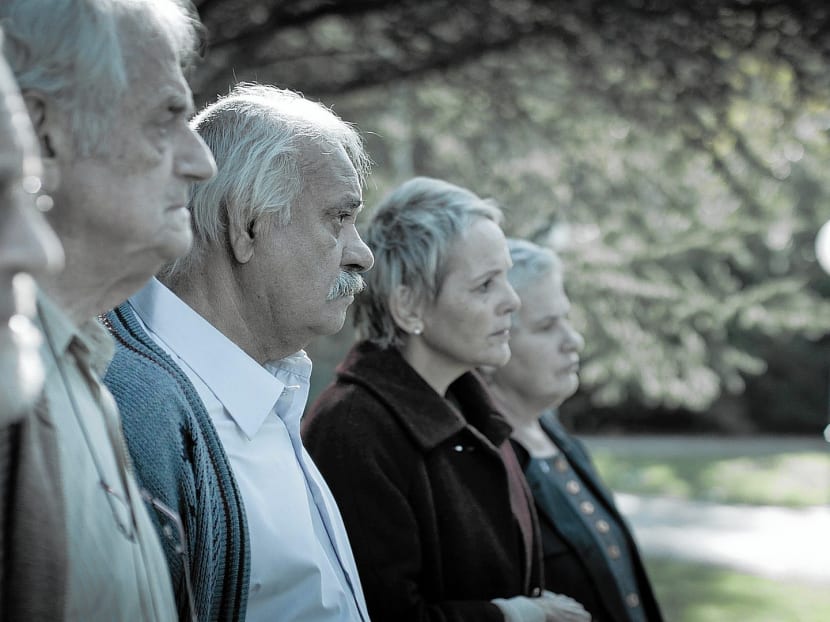S'pore movie-goers get a unique look at life in Israel through its cinema
SINGAPORE — The 24th annual Israeli Film Festival's opening film, ironically titled The Farewell Party, showcases an aspect of life that’s sometimes considered taboo – not just in Israel, but around the world.

A scene from The Farewell Party, which looks at the choices the elderly have to make when they reach their golden years.
SINGAPORE — The 24th annual Israeli Film Festival is seen as a “celebration of Israeli culture, with the aim of enriching the Israeli culture and society through compelling storytelling and cinematography”, say its organisers.
But this year’s opening film, ironically titled The Farewell Party, showcases an aspect of life that’s sometimes considered taboo – not just in Israel, but around the world.
The comedy-drama, helmed by noted film-makers Sharon Maymon and Tal Granit, looks at what happens to an elderly couple – Yehezkel and Levana (played by two of Israel’s top actors Ze’ev Revach and Levana Finkelstein) – when their friend Yana (Aliza Rosen) asks them to help euthanize her husband Max, who has terminal cancer, because he is suffering too much.
Max wants to die but any form of assistance in this matter is illegal in Israel. Yehezkel decides to build a machine that would allow the patient to self-administer a concoction that would painlessly kill him or her. Levana is violently opposed to this, on every ground imaginable.
The idea of The Farewell Party, said Maymon, came after the death of the grandmother of Maymon’s partner. “She suffered from cancer and death released her from suffering and pain,” he said, adding that he had thought it was an absurd idea for the paramedics to arrive after she had died and try to resuscitate her.
The film also looks briefly at the ideological, religious, moral and legal ramifications of performing euthanasia – even though it doesn’t directly offer any answers or resolutions – and the film-makers were keen to ensure that the audience would not be put off by the drama of it.
To that end, Maymon and Granit decided to employed comedians to star in The Farewell Party. “We wrote the script for Revach and for Levana because we knew them and it helped us to build the characters,” Maymon said.
“All the cast are well-known comedians from the 1970s, and it was important to cast comedians to deal with the emotional and dramatic scenes, because we know they would have that comic timing … would break the drama with the comedy,” he added.
“There were people who were … a bit concerned, but we felt this movie needed to be done. It’s a black comedy and we felt the audience could connect through the comedy,” added Granit.
The opening scene, for example, sees an elderly woman, Zelda, having a phone conversation with “God” (actually Yehezkel, who disguises his voice) to convince her to continue her medical treatments despite the pain she experiences.
Nevetheless, it was a “delicate balance” to get the tone of the movie right, said Granit. “It’s a serious subject: Euthanasia or mercy killing is very serious and we didn’t want to make fun of old people. The film portrays them as ordinary people with desires, passions and aims in life. We tried to find a humorous point to balance the serious subject. Of course, in the third act, when the main characters have to face difficult situations, there was no room for comedy.”
While the reactions from the public when The Farewell Party was first screened were generally positive – it was a blockbuster hit back in Israel and was nominated for several Ophir Awards (Israel’s Academy Awards), with wins for Revach and its cinematography – there were, of course, the naysayers.
“Among religious people, there were those who of course said, ‘No you cannot do (euthanasia), it’s against God’, but there were those who also realised that the modern times have brought along different conflicts – different moral conflicts,” said Granit.
“You live longer, but maybe your quality of life may be worse. Is prolonging life with machines something that comes from God? Man invented those machines. It’s a very difficult moral question that even religious people are dealing with.”
Maymon added: “In all our films, we deal with social subjects and it’s important for us to talk about such things. We do it via a comedy because it’s very accessible (but) all our films are about people who are going against the current.”
In the end, while The Farewell Party uses euthanasia as a plot vehicle, the film, said Granit, was really is about the “freedom of choice”.
“I think this film deals with a new modern problem, as societies around the world are getting older,” she said. “But for all the characters in the film – the gay couple, Levana, their friends … it’s about the freedom to choose how to live their lives – and how to end it.”
The 24th Israeli Film Festival runs from Sept 22 to 25. More details here.







